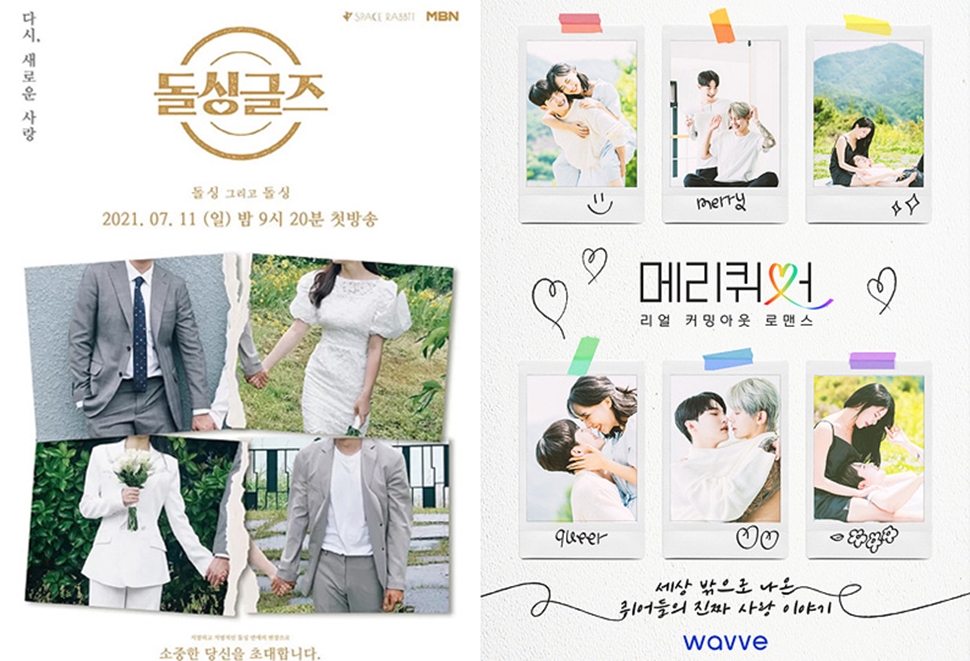[Nov] Korean dating reality shows gain global popularity
Date Nov 24, 2023
 (Left)A poster for "Love after Divorce," a reality show about divorced singles finding new loves (Courtesy of MBN); (Right)A poster for "Merry Queer," Wavve's reality show on LGBTQ romance (Courtesy of Wavve)
(Left)A poster for "Love after Divorce," a reality show about divorced singles finding new loves (Courtesy of MBN); (Right)A poster for "Merry Queer," Wavve's reality show on LGBTQ romance (Courtesy of Wavve)
It was about a decade ago in 2011 when SBS TV’s “Jjak” ignited Korea’s fever for blind-date reality shows. The controversial television series became a media sensation but was taken off the air in 2014 following the suicide of a female cast member.
Now, years later, dozens of reality dating shows are again leading a media trend in Korea.
These reality shows feature non-celebrity casts from various backgrounds who voluntarily come under one roof in search of the love of their lives. Analyzing them are a panel of hosts – consisting of comedians, TV personalities and even experts in psychology.
The spectrum of the genre’s diversity has grown along with the number of the shows.
The TIVING original series “Transit Love” reunites five women and men who used to date but broke up with one another for someone else. MBN’s “Love after Divorce” casts divorced singles seeking remarriage and provides an opportunity for them to live together once a couple is formed.
Last July, streaming platform Wavve produced “Merry Queer,” the country’s first LGBTQ reality dating show, which was followed by “Stranger’s Love,” in which male same-sex relationships are formed among the cast members.
Korean dating reality shows have garnered large audiences via Over-The-Top (OTT) platforms in recent years.
The first season of “Single’s Inferno” became the fifth most watched global TV show in a mere two weeks after it was released on Netflix last December, while ranking in the top 10 TV shows in 18 countries. The latest season of MBN’s “Love after Divorce” also ranked 38th among all Netflix content in August, proving Korean reality dating shows’ appeal to global audiences.
Netflix’s former co-CEO Reed Hastings himself expressed interest in the show last year. “Now, it’s impossible to talk about entertainment around the world without mentioning Korea. Recently, there was ‘Single’s Inferno.’ The whole world is falling in love with a Korean dating reality show,” he said, adding he looks forward to the next season of the series.
Then, what is behind their growing global popularity?
According to media experts, the success of Korean reality dating shows lies in their focus on delivering nuanced, delicate emotional exchanges between cast members.
“Frankly speaking, what Korean reality dating programs portray is not dating but the step just before dating – what we call sseom nowadays – and this is the differentiated strategy the Korean series take,” Yun Bok-sil, professor of media communication at Sogang University wrote in the 58th edition of Media and Issue Trends, a local bimonthly journal.
 Cast members of "Heart Signal" season 2 (Courtesy of Channel A)
Cast members of "Heart Signal" season 2 (Courtesy of Channel A)
Korean dating shows focus on cast members’ interactions as they get to know each other, unlike Western programs that tend to feature explicit physical interactions.
Ironically, this popularity comes amid Korea’s record-low birthrates and plummeting interest in real-life dating and marriage, according to Yun and other media experts quoted in the journal.
Korea's birthrate hit a new record low last year, with an average of only 0.78, government statistics show.
According to studies, the most avid Korean viewers are those who are seeking romantic relationships, get absorbed in the development of relationships among the cast and date vicariously through the programs.

The Ministry of Culture, Sports and Tourism's "Korea Here & Now" work can be used under the condition of "Public Nuri Type 1 (Source Indication)."




